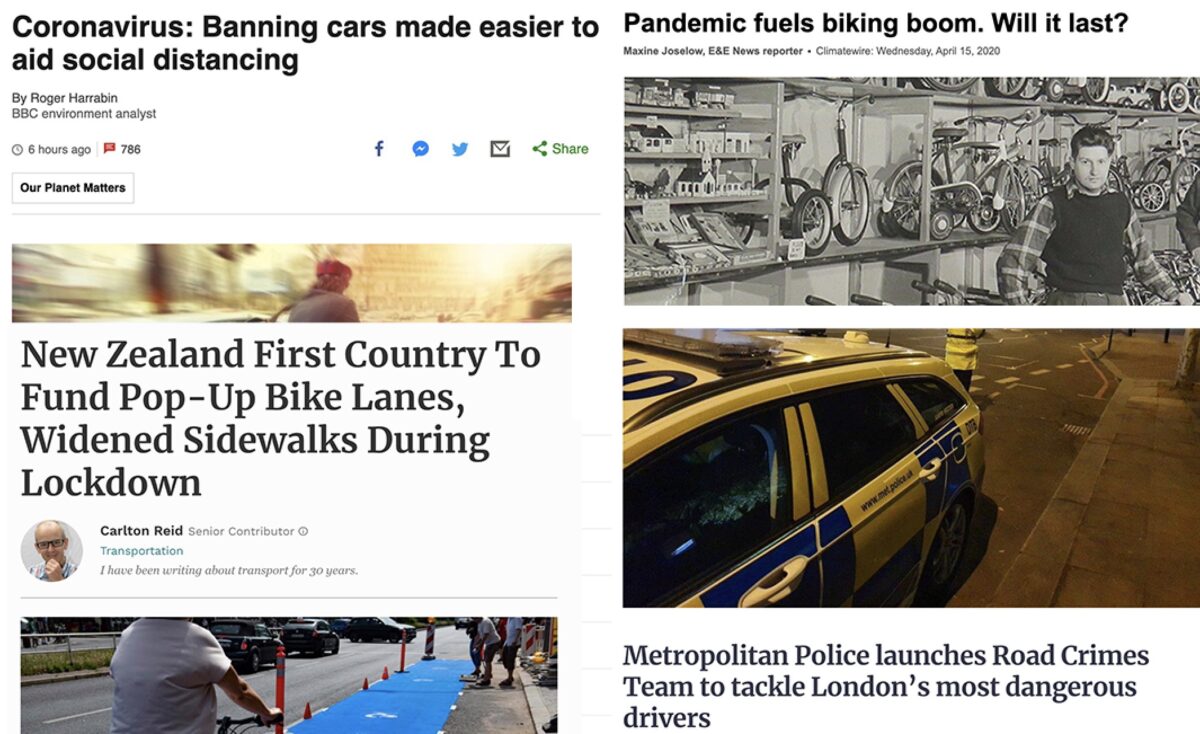
The Monday Roundup is sponsored by WesternBikeworks.com, the local source for all your cycling needs.
Here are the most notable items the BikePortland community came across in the past seven days…
Catch them speeders: A new enforcement detail has been created in London to focus specifically on high-risk speeders who are taking advantage of empty streets.
New Zealand’s pandemic streets response: Imagine living in a country where the head of transportation is a regular bike rider who steps up to subsidize bike lanes and sidewalks to create more safety and space during the coronavirus lockdown.
“Fragility” of car-dominant cities: The nonprofit Rocky Mountain Institute says the coronavirus has exposed how fragile our auto-centric cities are and creates even more urgency to create places where cars are not needed.
Advertisement
No car, no service: This past week we saw several examples of drive-thru health and other virus-related services that explicitly denied access to people without cars.
No tour, no cycling economy? In many ways, the Tour de France is the sun in the cycling industry ecosystem and some fear that if it doesn’t happen things could go sideways very quickly.
More pressure on Portland leaders: “I find it very insulting that our leaders think that we are unruly citizens who are going to start throwing block parties and licking each other’s faces because a street opened up,” said Portlander Sam Balto in this Portland Monthly article.
Seattle’s walking boom: Older people in Seattle are starting to walk more during the lockdown and the ones profiled in this article think their city should create safer streets so they can continue to do so post-pandemic.
Advertisement
Making it stick: “Right now, we have an incredible opportunity to reimagine the future of cities…How can communities like the Bronx, which has one of the worst asthma rates in the state, go back to diesel trucks polluting the air?,” says an advocate from New York City in this article from E&E News.
Easier to change?: “When people see how much easier it is to breathe outside, I think it will make it harder for decision-makers to avoid taking steps to make this norm, not the exception,” quotes a researcher in this Fast Company article about dramatic declines in air pollution.
Climate and Covid: “We need to design the stimulus not only to help the U.S. economy recover but to also become more resilient to the climate crisis,” according to this op-ed in the NY Times.
Government that works: “Councils [in London] can now cut red tape governing temporary road closures. This could help people walk and cycle whilst social distancing,” says an article just published by the BBC.
Video of the Week: The great Clarence Eckerson of Streetfilms has footage of New York City streets before-and-after the lockdown and says, “Coronavirus has changed our streets and we need to heed those lessons.”
— Jonathan Maus: (503) 706-8804, @jonathan_maus on Twitter and jonathan@bikeportland.org
— Get our headlines delivered to your inbox.
— Support this independent community media outlet with a one-time contribution or monthly subscription.



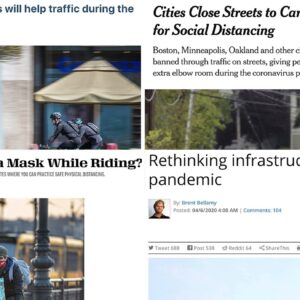
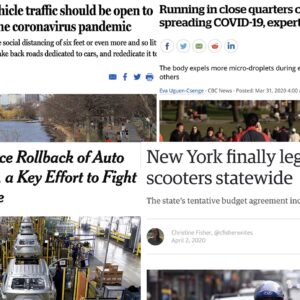
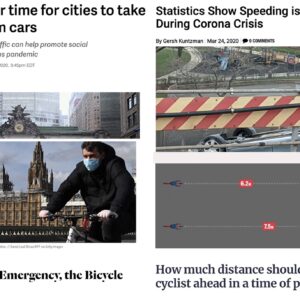
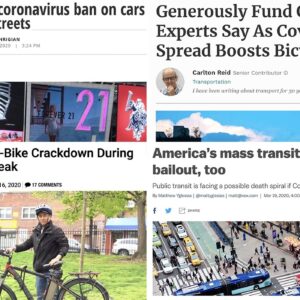
Thanks for reading.
BikePortland has served this community with independent community journalism since 2005. We rely on subscriptions from readers like you to survive. Your financial support is vital in keeping this valuable resource alive and well.
Please subscribe today to strengthen and expand our work.
Legitimate question: What will it take to convince Eudaly to create more bike lanes and open streets?
I’ve seen very little evidence that Eudaly is receptive to dissenting opinions, so I’m not sure she’s “convincible”.
IMO, and I’m quite aware people don’t like hearing this, especially from me, is that PBOT suddenly has a $24 million budget deficit, so their ability to do projects is now severely limited. Basically, the projects that are funded but still not implemented are all in East Portland, the poorest part of town. You have two basic choices: You can either bitch about how the city refuses to close off your favorite local street, and not get anywhere politically, the option most BP readers follow religiously. Or you can focus your advocacy towards making those East Portland projects happen sooner, possibly freeing up resources (personnel) for the rest of the city. Good luck!
A third choice might be for PBOT to give us some guidelines about how we can DIY in a manner that they would find acceptable.
My neighbors and I close our street often. Some saw horses, cardboard signs and a few blinky lights do the trick. We leave enough space for vehicles to transit but it’s definitely slowed traffic a lot. There are maybe 4-6 kids on the street that can utilize it better than a car. I will happily speak with any PBOT or PPB representatives if they care to do anything about the unreasonable speeding and disregarding of stop signs by many motorists. Our street is not a major arterial, but it definitely gets used as a bypass for Foster and any N/S to Harold and Holgate.
somebody decided the north side of Skidmore north of Wilshire Park was a good place to take some space (about 10 feet) away from cars. set out cones and spray-painted a dashed line and some playing child stencils. I saw several young folks using it when I rolled by yesterday.
Aren’t many parts of CCIM already funded as well? If so, I don’t see why we couldn’t continue to build those this summer—and more. It’s all quick-build, so it can’t be that expensive, right?
I’m a bike business owner a (very) former racer, a racing fan and I say if pro racing dries up and blows away it will be no loss at all for participant cycling and in fact may be beneficial. Most riders’ bike use and cycling experience have as little to do with pro racing as……….as………..Donald Trump’s speeches do with reality. Racing consciousness gets in the way of practical product and as much as I hate worrying about perceptions, the average cager’s perception of cyclists in general. Maybe it’s a sport whose time has come and gone.
The Tour will be cancelled this year, and we will all still ride our bikes. This is one of the biggest non-issues I can think of right now, all things considered.
The Tour generates Millions for France’s economy…
Glad it is no big deal and you can ride your bike.
The tour doesn’t actually “generate” millions for France’s economy. It just shifts it from other places in the form of tourism revenues or tv viewing revenues. So if those revenues don’t come to France this year it leaves those other places with more money. Thinking of tourism or spectator sports as a way to “generate” revenue is a bit of a shell game. It is more like the old mafia protection racket ( except voluntary) where the same amount of money is around, but it just gets shared with different people.
So if we don’t spend money on cycling infrastructure, it just gets spent in other places.
It all works out in the end.
Bicycle racing generates millions of dollars for European economies. Provides income for thousands of people.
Not just the Tour de France but the tour of Italy and Spain.
The Spring Classic season in Belgium alone is huge.
For a bicycle site to downplay Bicycle racing is amazing just because it is miniscule in America.
Myopic is too kind….
Yes, these events can’t go on right now, but it seems ridiculous for a supposed bicycle shop owner to celebrate their demise.
What shop do you own?
Haven’t we learned in the past six weeks that the service economy, the stock market, tourism, all that stuff is pretty fragile, expendable, not as good a bet as we once thought? I’m sure NASCAR or football Or pro wrestling also generate millions for the cheeses, but that doesn’t mean I am in favor of them, think they are a good idea, or that we should build our economy around the revenue expected from them.
All unemployed workers of the service industry are glad to know 9watts thinks their industry should go away.
You would twist what I said into something grotesque.
Our economy is fragile, the opposite of resilient, or do you disagree?
Once again you shoot the messenger.
The service industry does not go away if your arch nemesis Trump is not in power.
Your consistently antagonistic performance here suggests you are vying for that title.
For that matter, do you care to share how you feel about *rump since you are so free with your ventriloquist’s interpretation of how you imagine I feel about him?
It’s unreasonable to judge the resilience of our economy at this point, at the nadir (I hope) of one of the wort external shocks any of us has ever lived through. Give it time. We’ll make judgements like that in the years ahead, after we’ve seen how things play out. It’s premature to do so now.
Maybe it is premature; maybe not. I certainly don’t think we should not talk about these things, explore what we think we know or can learn. Our exchanges here, our (premature) judgements here teach me things every day.
le Tour has gone on for over 100 years, hardly a tourist or “service” economy gig.
It has a glorious history of men riding machines under their own power.
You would think someone like yourself would appreciate that…
Is there anything romantic or worthy in your world beyond subsistence?
Why do you feel the need to trash what I didn’t write?
“le Tour has gone on for over 100 years, hardly a tourist or “service” economy gig.”
You are the one who brought up the *economic* significance of the Tour de France in this conversation.
“It has a glorious history of men riding machines under their own power.
You would think someone like yourself would appreciate that…”
No one I don’t think has questioned or maligned that aspect here in this thread.
“Is there anything romantic or worthy in your world beyond subsistence?”
Where did that come from?
I am all for human power. Bike racing is one of the coolest things you can do with a machine without leaving the surface of the earth, requiring strength, skill, bravery and extreme tolerance for discomfort. Pain. But, pro bike racing has lately been riddled with doping, egregious sexism, and a lot of collateral fossil fuel consumption. Sure it’s associated with economic activity. Jobs. However if it went away I wouldn’t miss it.
Le tour could really use a sea change. How many times do you need to see an athlete involved in a crash with a 500 kilo(+) support or media vehicle?
I was going to say something similar. I think there are 10 cars for every bike in that race now.
I don’t need to watch that. I’d rather be riding my bike.
Remember when Portland was the place new transportation ideas started out? Or is that a created memory? Now I’m waiting to hear that a town of 10,000 in Missouri has closed down streets for people to walk and bike on, so then it will become safe for Portland to follow suit.
I get to say that because I’m from such a town.
Comment of the week?
Like all enduring myths, there is a kernel of truth in there somewhere. The rest is mostly seeing ourselves as we wish to be seen.
Yes, we all drive a Subaru, and we’re pretty good at calling folks out on Twitter, but maybe being truly progressive requires something more?
Yes, it requires taking action. If anyone would like to help, here’s a group on FB that is planning to quick- build protected bike lanes on Hawthorne to help businesses during the pandemic: https://www.facebook.com/groups/2676163202613424/
Well, first you have to tell everyone about how Progressive you are 🙂
And in the name of fairness, conservatives do the same thing with their ‘values’ as well.
It’s like an in-group competition to prove how much Kool-Aid you can drink in front of others.
We are in complete agreement on this one.
It’s a National tradition that the people love and their are industries built around cycle-tourism in Europe, because of the fame of the Grand Tours.
Thanks for your defense of pro cycling. It’s a tremendous economic loss, particularly for rural communities. It’s also devastating for all young riders who emerged out of ‘participant cycling’, meaning they got into cycling because they and/or their families simply enjoyed riding bikes. Sure, there are some generational pros, but to suggest that pro cycling is divorced from participant cycling is totally myopic. They are mutually beneficial.
Speaking of mutual benefits, thanks also for understanding economics 101 – that economic exchange generates wealth, rather than shifting it around. The loss of pro cycling, and pro sports in general, regardless of whether one follows it or even cares about it, should be recognized as a loss for everyone.
If she were mayor she could do it instantly.
But now if Wheeler does not like what she does he could yank PBOT from her.
Same thing governs the Rose Quarter I 5 expansion.
>If she were mayor she could do it instantly.
Okay, but she’s not the mayor…
> But now if Wheeler does not like what she does he could yank PBOT from her.
Has Wheeler actually weighed in on this at all? As far as I know, he’s more or less apathetic about safe streets. I could be missing something though.
Even when Sam Adams was both mayor and transportation commissioner, he wouldn’t have been able to do it instantly. There’s a lot of bureaucratic inertia in an organization as large as PBOT, lots of people who can (and do) throw a spanner into the works, people who can’t really be fired by anyone, not even by the mayor or the transportation commissioner, not even by the director. Welcome to reality.
Sucks to be us right now, but the purpose of all that bureaucratic inertia is to make sure, among other things, that all stakeholders have a voice. Those wrenches being thrown in the works – that actually IS the work, if your job is politics. In the best case it all results in an outcome that’s completely bulletproof against criticism. In the worst case at least the bureaucracy serves to slow down a powerful machine that can too easily be steered awry.
The mayor hires and fires bureau directors and sometimes some of the other senior staff, as well as assigns bureaus to each of the other four councilors, but yeah, his or her power is pretty limited.
Depends on the mayor.
I’ve watched every mayor in council from Goldschmidt to Wheeler.
Most accomplished, Vera. She got many things done in her 12 years.
Power is in the office if the occupant knows how to use it.
As she remarked to me once while waiting for the streetcar, “Don’t forget the legislature!”
Ran that pretty well too, not at all like the present dingbats.
Regarding the article on more seniors walking…I went out on Saturday sunset for a quiet walk in my old neighborhood and I could not believe how many people were walking around…folks I never used to see…there were enough clusters of walkers that I found it impossible to be socially distant without walking in the street or way into private property.
It got me thinking that for neighborhoods with sidewalks on both sides of the street – perhaps we need a national (international) adoption of only walking not he sidewalk that allows you to face traffic thus keeping flows in one direction to minimize “COVID19 Congestion” on sidewalks. This would reduce the stress especially for pedestrian that choose to not wear a mask at this point of the health emergency.
I’ve noticed the same thing, todd. All the sadder that local gov’t isn’t doing more to re-allocate space to other users, as J has pointed out.
Yesterday while I was walking thru my hilly SW Portland neighborhood, a yahoo in a blue-green pick-up truck came bombing down a neighborhood 20-mph street – must have been doing 35-40 mph. I pointed at children playing nearby and waved my arms, but he just waved at me as he flew by – not stopping at the stop sign at the bottom of the hill as he turned right.
I don’t know why it always seems to be dudes in trucks who drive stupidly, but as long as we continue allocating 98% of the road space to drivers of motor vehicles, those drivers are going to abuse that space to the max.
You also saw an example that stood out. Did you see any other cars driving normally or were they all displaying the same egregious behavior?